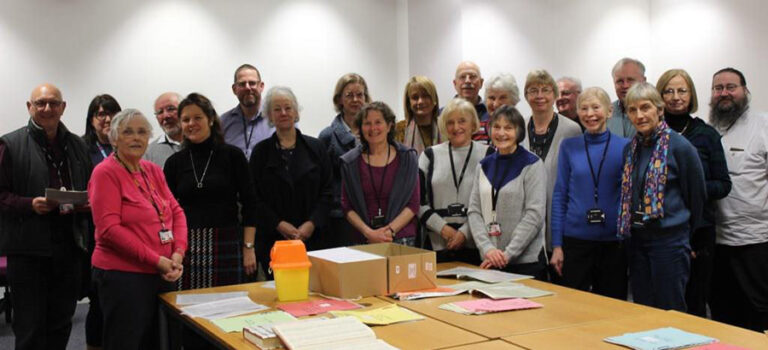Just under a year ago, I wrote a blog on the challenges COVID-19 had brought to our on site volunteers. At that point, we were just emerging from lockdown 1.0, blissfully unaware that a further two lockdowns would grip us in the autumn and winter months. Now, as we emerge from the third lockdown, and as we celebrate National Volunteers’ week, we reflect on not only the impact COVID-19 has had on our volunteers but also on the opportunities it has provided.
Despite not being able to operate on site at The National Archives in Kew for much of the past 12 months, our volunteers have achieved amazing successes. While it is true that certain volunteer projects had to come to an abrupt pause because of COVID-19, it was reassuring to see that other projects flourished as they were able to continue just as effectively online.
Many of our volunteers simply changed projects for the course of the year. For example, three remote projects made immense progress. The First World War Royal Navy Lives at Sea project, in collaboration with the National Maritime Museum (NMM) and the Crew List Index Project team (CLIP), has created a free-to-search database resource relating to all the Royal Navy officers and ratings that served in the First World War, based principally on service records held by The National Archives.
This unique resource also marks and commemorates the Royal Navy’s contribution to the First World War effort through the lives of those officers and ratings who served. Thousands of volunteers across the globe transcribed personal data from service records to help create the database which now enables researchers to understand where men were recruited from, and from which trades.
It also allows researchers to create crew lists for ships and submarines for given dates. Such lists do not survive for the First World War and so, for the very first time, researchers will be able to place officers and ratings alongside each other in naval battles of the War and study topics such as mortality rates, invalidity and its causes. The volunteer work is now complete though the database is still being added to as records are checked and verified.
In this Census year, hundreds of e-volunteers helped to index records of the 1851 Ecclesiastical Census, 170 years after the Census took place. The record series HO 129 consists of ecclesiastical census returns of churches and chapels, endowments, sittings, estimated attendances on 30 March 1851 and average numbers during the preceding 12 months. Our catalogue now provides the results of the Census for every place of worship, including details of individuals who submitted the data. Audrey Collins, our Family History Record Specialist, supervised this project and will write a blog on it later this week so watch out for that.
Similarly, volunteers have been cataloguing 19th-century British Army returns of officers and non-commissioned officers in the series WO 25 and WO 76 enabling researchers to quickly navigate the digital microfilm in our catalogue, Discovery. This project is ongoing and you can join in by going to the transcription platform, From The Page. You will need to create a free account but once you have done this you can start transcribing our records with us. There will be a dedicated blog on WO 25 and WO 76 later this summer, celebrating the work of the volunteers who have revealed some interesting cases. Collectively, we have had more than 650 volunteers transcribing over 65,000 pages of records in the space of 12 months.

Despite the success of the remote projects, it’s encouraging to see many of our volunteers return to their roles on site, supporting our Library, Collection Care and Collections Expertise and Engagement departments as they open up our collections to new and existing audiences.
During the course of this week, we will be celebrating the work of our volunteer army so watch out for blogs and social media posts. In the meantime, whatever their contribution is, I’d like to thank each and every one of our volunteers.
If you are interested in finding out more about our volunteering strategy and opportunities for volunteering, please visit our website.